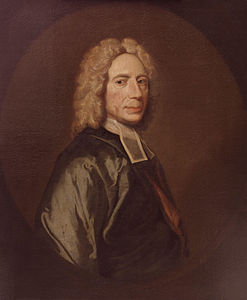Analysis of Psalm 65 part 2
Isaac Watts 1674 (Southampton, Hampshire) – 1748 (Stoke Newington, Middlesex)
v.5-13
L. M.
Divine providence in air, earth, and sea.
The God of our salvation hears
The groans of Zion mixed with tears;
Yet when he comes with kind designs,
Through all the way his terror shines.
On him the race of man depends,
Far as the earth's remotest ends,
Where the Creator's name is known
By nature's feeble light alone.
Sailors, that travel o'er the flood,
Address their frighted souls to God,
When tempests rage and billows roar
At dreadful distance from the shore.
He bids the noisy tempests cease;
He calms the raging crowd to peace,
When a tumultuous nation raves
Wild as the winds, and loud as waves.
Whole kingdoms, shaken by the storm,
He settles in a peaceful form;
Mountains, established by his hand,
Firm on their old foundations stand.
Behold his ensigns sweep the sky,
New comets blaze, and lightnings fly;
The heathen lands, with swift surprise,
From the bright horrors turn their eyes.
At his command the morning ray
Smiles in the east, and leads the day;
He guides the sun's declining wheels
Over the tops of western hills.
Seasons and times obey his voice;
The ev'ning and the morn rejoice
To see the earth made soft with showers,
Laden with fruit, and dressed in flowers.
'Tis from his wat'ry stores on high
He gives the thirsty ground supply;
He walks upon the clouds, and thence
Doth his enriching drops dispense.
The desert grows a fruitful field,
Abundant food the valleys yield;
The valleys shout with cheerful voice,
And neighb'ring hills repeat their joys.
The pastures smile in green array;
There lambs and larger cattle play;
The larger cattle and the lamb
Each in his language speaks thy name.
Thy works pronounce thy power divine;
O'er every field thy glories shine;
Through every month thy gifts appear;
Great God, thy goodness crowns the year!
| Scheme | AXA XXBB CCDD XXEE FFGG HHII JJKK LLXX MMNN JJOO PPMX LLXX QQRR |
|---|---|
| Poetic Form | |
| Metre | 1 11 0110001101 011100101 01110111 11111101 11011101 11011101 11010101 101111 11010101 101101001 111111 1110101 11010101 1101011 11010111 10100101 11010111 11010101 11000101 10010111 11110101 0111101 11010101 01011101 10110111 11010101 10010101 11010101 10011101 10010111 01100101 110111110 101101010 1111111 11010101 11010101 11010101 01010101 01010101 01011101 0110111 01010101 11010101 01010001 10110111 110111001 1010011101 110011101 11110101 |
| Closest metre | Iambic tetrameter |
| Characters | 1,743 |
| Words | 313 |
| Sentences | 17 |
| Stanzas | 13 |
| Stanza Lengths | 3, 4, 4, 4, 4, 4, 4, 4, 4, 4, 4, 4, 4 |
| Lines Amount | 51 |
| Letters per line (avg) | 28 |
| Words per line (avg) | 6 |
| Letters per stanza (avg) | 108 |
| Words per stanza (avg) | 24 |
Font size:
Submitted on May 13, 2011
Modified on March 05, 2023
- 1:36 min read
- 28 Views
Citation
Use the citation below to add this poem analysis to your bibliography:
Style:MLAChicagoAPA
"Psalm 65 part 2" Poetry.com. STANDS4 LLC, 2024. Web. 5 May 2024. <https://www.poetry.com/poem-analysis/19794/psalm-65-part-2>.


Discuss this Isaac Watts poem analysis with the community:
Report Comment
We're doing our best to make sure our content is useful, accurate and safe.
If by any chance you spot an inappropriate comment while navigating through our website please use this form to let us know, and we'll take care of it shortly.
Attachment
You need to be logged in to favorite.
Log In